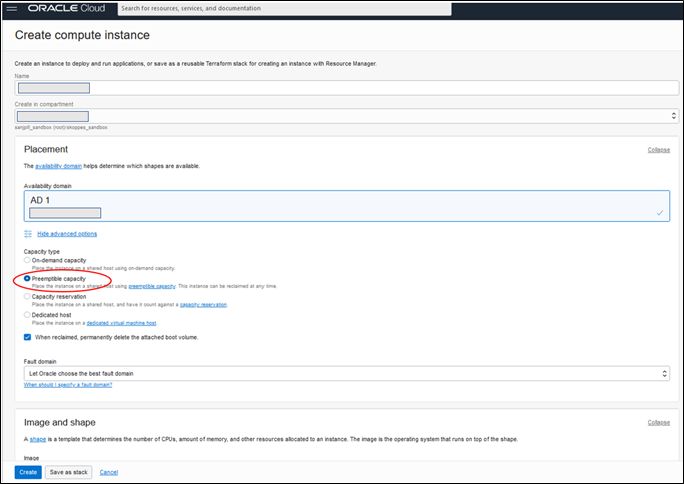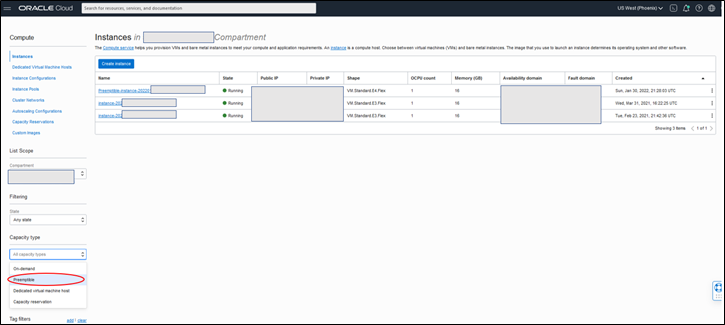We’re excited to announce that preemptible instances are now available on all virtual machine (VM) shapes, except the VM.Standard.E2.1.Micro. Preemptible instances allow you to run periodic and short-term workloads at half the cost of on-demand instances.
What are preemptible instances?
Preemptible instances are the same as on-demand instances, with one exception: If you need compute capacity elsewhere, Oracle Cloud Infrastructure (OCI) can delete preemptible instances after a short notice period. Preemptible instances run on unused on-demand capacity, enabling OCI to offer preemptible instances to you at a 50% discount compared to on-demand rates. OCI can delete preemptible instances if the requests for on-demand instances increase. Preemptible instances run on the same hardware, offer the same performance, and are managed using the same tools as on-demand instances.
Pricing for preemptible instances is simple: Always 50% off your on-demand instance rates. This discount stacks with other discounts you have, such as Universal Credit (UCM) negotiated rates. Some other cloud providers offer a similar product called spot instances, which change price when demand changes. This shift can make it difficult to forecast costs and can lead to billing surprises when spot instance prices unexpectedly approach on-demand prices. With OCI preemptible instances, you always know exactly how much each instance costs: You get 50% off the on-demand price you pay, all the time.
Combined with OCI’s already low instance prices, OCI preemptible instances are cheaper than spot instances by up to 38%, comparing OCI E3 Flex to Amazon Web Service m5a. Tracking spot prices can also be complicated because the prices vary by instance type and region. OCI makes your life easy: Preemptible instances are always 50% off the price you pay regardless of shape or region.
Get started with preemptible instances
Before running your workloads on preemptible instances, familiarize yourself with the preemptible instances technical documentation to learn more about the associated risks and limitations of this unique instance type, and evaluate whether your use cases can tolerate these risks.
Preemptible instances use the same management experiences as on-demand instances, including the Console, CLI, REST API, and Terraform. In the Console, after clicking Create instance, you can create a preemptible instance by selecting Show advanced options in the Placement section and select Preemptible capacity for capacity type. Preemptible instances also use the same quota and limits as on-demand instances.


You can also view all preemptible instances by selecting the preemptible capacity type in the Placement section.

OCI sends a termination notice through the Events service before deleting a preemptible instance. You can monitor these notices and create logic to act if OCI deletes an instance anywhere in your tenancy, such as using a function to request a new preemptible instance. For more information, see the documentation about tracking instance terminations.
Use cases
-
Tests and simulations that can be stopped and resumed later
-
Batch jobs, such as encoding, rendering, and financial modeling
-
Other short-term processes or applications
Conclusion
Preemptible instances let you take advantage of the same hardware, performance, and management tools as on-demand instances at 50% of the price.
Preemptible instances are recommended for only workloads with high tolerance for interruptions that can withstand instance preemption. When on-demand instance requests increase, Oracle can reclaim preemptible instances with a short notice period.
Preemptible instances are available on all virtual machine (VM) shapes except for the VM.Standard.E2.1.Micro. Compared to other cloud providers, OCI provides preemptible instances at predictably low costs with no billing surprises: Always 50% off the on-demand prices.
For more information, see the product documentation about preemptible instances. You can try out preemptible instances and other Oracle Cloud Infrastructure services by signing up for a trial account with $300 in credits.
